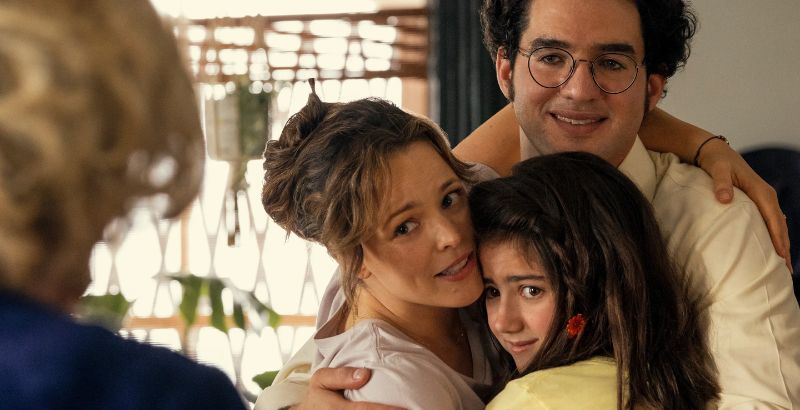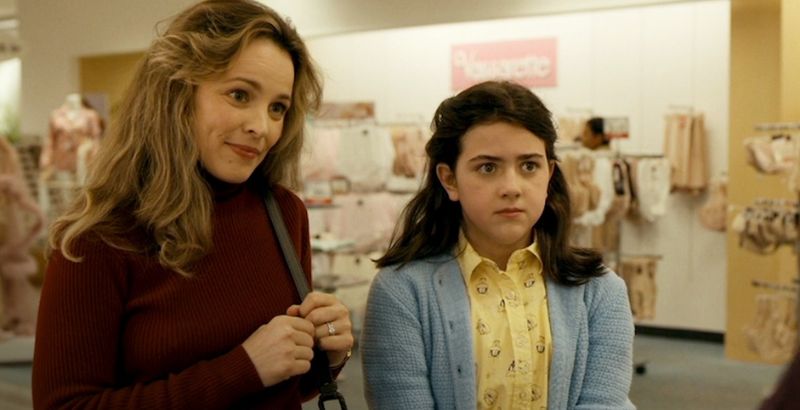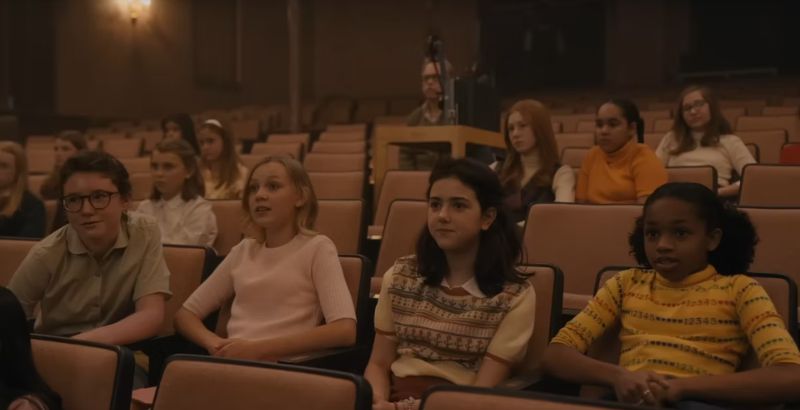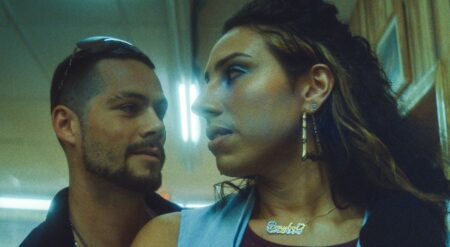
Directed and written by Kelly Fremon Craig, Are You There God? It’s Me, Margaret is based on Judy Blume’s groundbreaking novel of the same name. Capturing the humor and unashamed approach growing up, the film follows 11-year-old Margaret (Abby Ryder Fortson) is uprooted from her life in New York City for the suburbs of New Jersey when her dad gets a promotion at work. While she tries to adjust to the new school and life, she also has to deal with the messy and tumultuous throes of puberty with new friends in a new school. She relies on her mother, Barbara (Rachel McAdams), who is also struggling to adjust to housewife life, and her adoring grandmother, Sylvia (Kathy Bates), who isn’t happy they moved away.
Are You There God? It’s Me, Margaret is one of the best adaptations I’ve ever seen, but beyond that, it’s a film that speaks across generations of women and experiences as well. I got the chance to speak with Writer-Director Kelly Fremon Craig about bringing Judy Blume’s iconic work to life for a new generation, maintaining authenticity throughout, and using inclusivity as a driving force behind the story.
BUT WHY THO: So my first question is really about the intergenerational component of a Judy Blume story. What your film does so well, is that it captures different generations of women, but not siloed off. Instead we see how they relate to each other, grow from each other and learn. Was that a goal of the film? To bring together the generations?
KELLY FREMON CRAIG: One hundred percent! In my mind, my fantasy was that people would show up, and they would expect to relate to Margaret on an aesthetic level, but then the surprise would be they relate to Barbara on a more immediate level or Sylvia. You know what I mean? That was important to me. And also, I feel like, my life is such that I’m constantly on this kind of coming-of-age trajectory. I’m always just struggling to find my way when I’m in the middle of transitions, and I feel like I did in adolescence.
BUT WHY THO: And I think that that was something that I loved about this film is, I feel like a lot of the times coming of age dramas have to have some climactic, dramatic, traumatic event. But it’s not that in [Are You There God? It’s Me, Margaret]. It’s just life. And I thought you beautifully captured that messiness. What went into really crafting what parts of adolescence would be involved in the film?
KELLY FREMON CRAIG: Well, I knew absolutely, that I wanted to make a really faithful adaptation, because I love the book. And I love Judy Blume. So I knew that was number one. So, a lot of it was really just trying to serve what was in the book and translate it to film. Then, my next thought was like we just talked about, thinking about how to expand it. You know? Learning how to expand those adult characters. Still, in general, every time I made a change or veered off from the book, the question that was always kind of my North Star was “Does it make me feel the way the book made me feel?” or “Does it feel like Judy Blume?.”
To me, Judy Blume is about telling the truth. She is about exploring, even the sort of embarrassing details that you don’t want to say out loud. She says the unsayable. She’s almost a little electrifying when you read some of the things that she writes. It felt that way when we filmed Margaret putting a pad in her underwear for the first time. And walking around with it. It was funny, but it was also like, “wow, I don’t know if anyone ever filmed this before!” And maybe they have I don’t think I’ve seen it. There was something exciting about showing that.

BUT WHY THO: And I think that there’s a lot that you show in the film. Very specifically, is it’s not always dialogue, sometimes it’s just two characters are interacting. Barbara was handled so well, where she’s not the main focus. But you see her trajectory going from a working mom to “I have to be a housewife now.” What was it like capturing those smaller moments and making sure that it resonated?
KELLY FREMON CRAIG: First of all, so much of it is a credit to Rachel McAdams. Somehow she’s able to convey so many layers of emotions just on her face. In particular, the moment where she comes out of the bathroom at the end of Margaret’s first period, and she has that moment alone right outside the door. It just breaks my heart every single time I see it, because I think that is motherhood. Just when you love someone so much, it hurts. It’s just the feeling of they’re growing up and they don’t need you anymore.
It’s a sort of heartbreak, but she also captures the beauty of that moment, because that’s what you want them to do. It’s such like a mix of emoitons that makes me cry right now. I feel like she nails it. So it’s all a credit to her. And we got through a lot of conversations. We would discuss a scene, the emotion and then she would say, “Okay, got it!” and then do something beautiful.
BUT WHY THO: You mentioned always coming back to asking yourself “is this how the book made me feel?” Is there anything really personal for you that you put in the film?
KELLY FREMON CRAIG: I felt like I was Margaret in a million ways I was a late bloomer and really upset about it. But actually, I would say, Barbara’s story is more personal to me now, you know? I definitely struggle with trying to somehow find this balance between being the kind of mom I want to be, and giving the time and attention to this career that I love. But that sometimes takes me away from my kid. Those two things, sometimes have a hard time existing together. I don’t know how to do that all the time so I’m always worried.
Am I serving them both well enough? The question is more around my kid, honestly. I ask myself, am I being a good enough mom, while I have this other thing that I love? Am I doing right by him and raising him and all the right ways? Like, that’s always something I’m anxious about.
Read Our Review of Are You There God? It’s Me, Margaret Here.
BUT WHY THO: Going off of that into some of the larger components of having everybody find a piece of themselves in this film, I found myself really amazed with how inclusive everything felt. Because sometimes it’s easy to walk into these stories, and ask, “Am I in here?” This goes into the moment we see with Janie, were her mother’s using the hot comb, and washign her hair. You show audiences the process of getting ready. Why did you make sure to include that in the film?
KELLY FREMON CRAIG: I think the details are important. The truth is, you use those to see where you are in a story. It’s those little details, and that that scene in particular, is where Ihave to give so much credit to my Assistant Director, because she she helped me make sure that I was getting all of those details, right. She explained everything. On the day, I said, “You’re directing this with me,” and alsways asked her to show me, and I asked “Does this look right?” She explained it all, you get on the sink, your mom washes your hair like this. And she, she was wonderful about every little detail and that like that, which to me is so important.
I think representation matters. It’s a big part of why I started writing and why I started wanting to make films because I didn’t feel like my own experience as a girl and a woman was represented. But I also didn’t feel that my friends and people that look like my friends were represented either. That felt ridiculous to me and wrong. I feel like I am constantly trying to like move the needle in that regard.

BUT WHY THO: I think the film did that beautifully. It really showcase that there are different ways to be a girl there are different ways to get ready like this a small things how everybody gets ready differently. Yes. And I wanted to ask too, there was a message that it’s okay to go at your own pace to be different. The film says that it’s okay to perform femininity differently. What was the process behind this? [Are You There God? It’s Me,Margaraet] is concise but you’re also covering the multitude of experiences that could be there and just saying, “Hey, it’s okay.”
KELLY FREMON CRAIG: I do think there are a multitude of experiences and feelings around adolescence and going through this transition in your life. That was actually one thing that I thought of a lot when I was filming the menstruation video, that whole filmstrip, where the girls were reacting. I really wanted to get the full spectrum. From being intrigued to being like, “whatever, I already know all this” to the girl gagging. The gagging made me laugh so much. You know what I mean? Like, I think everybody comes to it with different feelings and there is no one emotional experience around this.
BUT WHY THO: What do you want people to walk away with the moment the credits roll? What do you want them to feel?
KELLY FREMON CRAIG: You know, I really, I want them to be moved. I want them to relate. I want them to feel hopeful and I also really want them to tell their own stories to each other. That’s why I wanted to release it theatrically. I wanted it to be a collective experience where you walk out of the theater and you start to tell your own story and laugh. Yeah. And reminisce and connect and bond over the experience of of the story.
Are You There God? It’s Me, Margaret, captures the messiness of growing up, and that’s thanks to Kelly Fremon Craig’s attention to detail, experience, and inclusivity. From across the generations of characters in the film, this one offers a unique touch point for every member of the audience.
Are You There God? It’s Me, Margaret is playing nationwide April 28, 2023.






